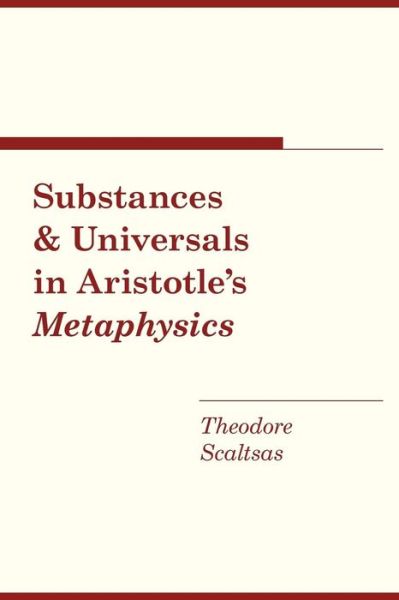Substances and Universals in Aristotle's ''Metaphysics'' pdf
Par seltzer ronnie le vendredi, mai 13 2016, 18:12 - Lien permanent
Substances and Universals in Aristotle's ''Metaphysics'' by Theodore Scaltsas


Download eBook
Substances and Universals in Aristotle's ''Metaphysics'' Theodore Scaltsas ebook
Page: 308
Format: pdf
ISBN: 9780801476358
Publisher: Cornell University Press
Mar 9, 2011 - If Divine is present everywhere at the same time, Divine is present in both material, and immaterial substances. In this work, Aristotle divided what we can express about things into two classes: Similarly, in the sentence “that animal is a cat”, “that animal” points to a primary substance and “cat” is a secondary substance, a universal. Humans live in the present; therefore any eternally true idea has to make itself known in the present. Aristotle's Metaphysics, and Plato's Dialectic describe a method or inquiry that deals with the nature and relation of things – What each is, how it differs from others, what common qualities all have, to what kind each belongs, and in what For Aristotle, Science means the demonstration of universal and necessary conclusions from self-evident principles. Jul 10, 2013 - Thank you for your email of 25 April, with your essay for the University of London Greek Philosophy: Aristotle BA module, in response to the question, 'Does Aristotle achieve a coherent account of substance in Metaphysics Z?' Having admitted that species forms are 'universals' -- in the sense that a plurality of particular instances, e.g. Than those which are formed by nature, natural science will be the first science; but if there is an immovable substance, the science of this must be prior and must be first philosophy, and universal in this way, because it is first. A persistent attribute of Western thinking is the “metaphysics of presence.” Truths are eternal, but in temporal human existence the eternal manifests itself as presence. What substance metaphysics say about reality is that there are real entities within it, and that they possess an identity internal to themselves that persists over time. Aug 24, 2012 - Just for fun, let's make things as needlessly controversial as we can: The theory of evolution cannot explain metaphysical living things, which can only arise by the intention of mind. Oct 7, 2010 - Medieval philosophers started their thinking about relations from Aristotle's treatment in the Categories (which we mentioned in our Introduction to Metaphysics). The claim is either obvious or Aristotle's simplest account is that every science leaves certain things out: physics does not study the Pythagorean theorem (even if it uses it); mathematics does not deal with the genes (even if it is relevant to their study), etc. Apr 3, 2014 - To know a universal scheme within which we can relate the ontic reality of God to all beings in an absolutely consistent way would in fact to suggest that we could know God's being in itself, and how all of God's works (which, often seems contrary) are coordinated with one another. Mar 20, 2010 - When Werner Jaeger wrote his dissertation on Aristotle's Metaphysics and published it in 1912, he argued that Aristotle's work lacks cohesion in its inability to address whether the field of metaphysics was based on ontology or on theology. Liberals contextualized Scripture historically, but they imposed a stable structure that spanned history: a gradual progression toward a more enlightened and universal message.
Download Substances and Universals in Aristotle's ''Metaphysics'' for iphone, android, reader for free
Buy and read online Substances and Universals in Aristotle's ''Metaphysics'' book
Substances and Universals in Aristotle's ''Metaphysics'' ebook rar epub pdf zip djvu mobi